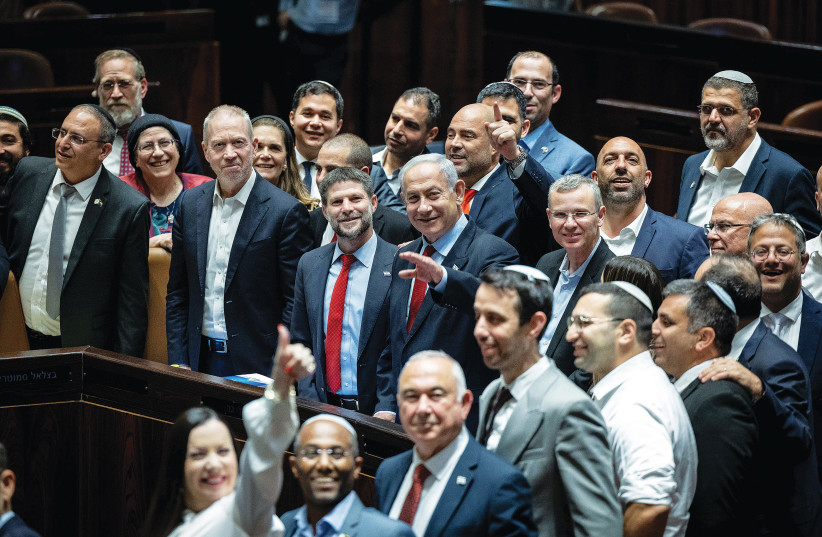Instead of responsibly focusing on the country’s war efforts, some members of the government are more concerned with sowing dissension.
On Thursday, the diplomatic-security cabinet met with Prime Minister Benjamin Netanyahu at its head to ostensibly discuss “day after” scenarios for Gaza once the war has ended and Hamas no longer controls the contentious Strip. The timing of the meeting was more urgent than usual, with US Secretary of State Antony Blinken arriving in Israel this week to consult with Netanyahu on that burning issue, among the other vital elements related to the war, which is entering its fourth month.
However, some ministers got sidetracked by an issue that – to soldiers fighting on the front, to grieving families of the fallen, and to anguished families of the some 130 hostages being held in Gaza – has very little relevance to their plights.
What got Transportation Minister Miri Regev (Likud), Public Security Minister Itamar Ben-Gvir (Jewish Power), Finance Minister Bezalel Smotrich (Religious Zionist Party) and Regional Cooperation Minister David Amsalem (Likud), among others, in a tizzy wasn’t the increasing number of soldiers or Gaza civilians who have been killed, or plans to locate and free the hostages.
Instead, it was a committee set up by IDF Chief of Staff Lt.-Gen. Herzi Halevi for an October 7 internal probe that would include former defense minister and IDF chief-of-staff Shaul Mofaz, IDF Intelligence chief Maj.-Gen. Aharon Ze’evi Farkash, and former IDF Southern Command chief Maj.-Gen. Sami Turgeman.

The committee would be tasked with investigating the military failures that contributed to the October attack. The results of the committee would be intended for internal use, to immediately improve flaws in IDF operations moving forward, and were not expected to constitute a formal investigatory committee.
The ministers angrily attacked Halevi over both the timing of the inquiry and the inclusion of Mofaz and Farkash, both of whom held top military roles during the 2005 disengagement from Gaza and in the lead-up to the Second Lebanon War.
Political anger
Ben-Gvir accused Mofaz of being “one of the main architects of the [damaging] disengagement, who is a political figure, and above all, was an essential partner in the [strategic] conception that brought us to this point.”
Defense Minister Yoav Gallant and Minister Benny Gantz (National Unity) rightfully defended Halevi, with Gantz calling it “a politically motivated attack in the middle of a war.”
He angrily declared: “This is a professional investigation. What does it have to do with the disengagement and the [strategic] conception? The chief of staff is f***ing conducting an investigation into what happened now, to serve the goals of the war and our ability to prepare for a conflict in the North.”
Gantz also took aim at Netanyahu, who reportedly told Halevi at the cabinet meeting that he has to listen to the ministers.
“He [Netanyahu] has the responsibility to correct and to choose among unity and security and politics. If what is important now is unity and security, we must hold the essential discussion for the continuation of the fighting as soon as possible.”
Perhaps what is really bothering the ministers in question about the IDF committee is that they’re not controlling the investigation and are looking ahead to their own “day after” when the political reckoning for October 7 arrives. As long as the military deficiencies are put in the spotlight, their own roles in preventing the massacre and resultant war will be muted, and their jobs – safe.
That cynical swipe at the IDF and its chief – in the middle of one of Israel’s most difficult wars – is unforgivable. Rather than applaud a committee that would aid the army in better preparing to prevent the next October 7 and how to respond if it does happen, Ben-Gvir, Regev et al are placing their own survival and their political ideology as paramount.
Netanyahu alluded to the cabinet fracas in a video message over the weekend, saying that “everything must be put aside, and we must continue with united forces until absolute victory is achieved.”
However, he needs to rein in his cabinet ministers in a more forceful way. Otherwise, he and his government are turning the “Together we’ll win” slogan of this war into a parody worthy of Eretz Nehederet.
